-
ORIGINAL ARTICLE12-04-2023
Sepsis and COVID-19: outcomes in young adults in intensive care
Revista Brasileira de Enfermagem. 2023;76(6):e20230037
Abstract
ORIGINAL ARTICLESepsis and COVID-19: outcomes in young adults in intensive care
Revista Brasileira de Enfermagem. 2023;76(6):e20230037
DOI 10.1590/0034-7167-2023-0037
Views0See moreABSTRACT
Objective:
to verify sepsis incidence among young adults admitted to intensive care due to COVID-19 and to analyze its association with demographic, clinical and outcome variables.
Methods:
a quantitative, longitudinal, retrospective and analytical study, consisting of 58 adults aged 20 to 40 years in intensive care for SARS-CoV-2. It was carried out in a university hospital, from March 2020 to December 2021, with data collected from electronic medical records.
Results:
sepsis incidence was 65%. Sepsis was associated with acute kidney injury, use of vasoactive drugs and mechanical ventilation, being admitted to the emergency room, severity according to the Simplified Acute Physiology Score III and bacterial pulmonary co-infection, the latter being the most frequent etiology for sepsis.
Conclusions:
there was a high sepsis incidence, with 42% of deaths, which points to the importance of investing in preventive measures, especially in relation to bacterial pulmonary coinfections.
-
ORIGINAL ARTICLE12-04-2023
Clinical simulation scenarios for the planning and management of infusion therapy by nurses
Revista Brasileira de Enfermagem. 2023;76(6):e20230019
Abstract
ORIGINAL ARTICLEClinical simulation scenarios for the planning and management of infusion therapy by nurses
Revista Brasileira de Enfermagem. 2023;76(6):e20230019
DOI 10.1590/0034-7167-2023-0019
Views0See moreABSTRACT
Objective:
to build, evaluate and test two clinical simulation scenarios for the planning and management of infusion therapy by nurses.
Methods:
methodological study, with construction of scenarios based on the NLN Jeffries Simulation Theory and the theoretical model Vessel Health Preservation; evaluation of the scenario design by judges, with calculation of the Modified Kappa Coefficient (MKC); testing scenarios with the target audience. Results: scenarios built for: 1. Patient assessment and vascular device selection; and 2. Identification and management of deep vein thrombosis. In the evaluation by judges, testing of validated scenarios in relation to educational practices and simulation design, the items evaluated presented MKC values ≥ 0.74.
Conclusion:
two evidence-based scenarios related to infusion therapy were constructed, with high levels of agreement among judges regarding their design. In testing with nurses, good results were obtained regarding the design and structuring of educational practice.
-
12-04-2023
Sleep quality of nurses who worked in coping with COVID-19: an integrative review
Revista Brasileira de Enfermagem. 2023;76(6):e20230007
Abstract
Sleep quality of nurses who worked in coping with COVID-19: an integrative review
Revista Brasileira de Enfermagem. 2023;76(6):e20230007
DOI 10.1590/0034-7167-2023-0007
Views0See moreABSTRACT
Objective:
to analyze sleep quality of nurses who worked coping with COVID-19 in scientific evidence.
Methods:
an integrative review, carried out in seven databases, including studies between December 2021 and June 2022, without language restrictions. The sample consisted of 15 primary studies.
Results:
nurses working in hospital, intensive care, outpatient care and teaching institutions constitute a vulnerable group for sleep disorders: latency, duration, efficiency and quality. The disorders identified involved insomnia at varying levels of severity: daytime dysfunction and morning sleepiness. Night work and low capacity for self-care were determinants of impaired sleep patterns.
Final considerations:
the COVID-19 pandemic contributed to greater vulnerability of nurses to changes in sleep, requiring strategies for risk management and well-being promotion.

-
ORIGINAL ARTICLE12-04-2023
Work and Mental Distress among Nurses in the Amazon Region of Brazil during the COVID-19 Pandemic
Revista Brasileira de Enfermagem. 2023;76(6):e20220792
Abstract
ORIGINAL ARTICLEWork and Mental Distress among Nurses in the Amazon Region of Brazil during the COVID-19 Pandemic
Revista Brasileira de Enfermagem. 2023;76(6):e20220792
DOI 10.1590/0034-7167-2022-0792
Views0See moreABSTRACT
Objective:
To assess the relationship between psychopathological symptoms and the social, clinical, and occupational profile of nurses in the Amazon region of Brazil during the COVID-19 pandemic.
Methods:
A descriptive cross-sectional online study was conducted in 2020 with 261 nurses. The Symptom Assessment Scale-40 was utilized.
Results:
The presence of pre-existing conditions before the pandemic was associated with psychotism (p=0.044). Experiencing constraints and/or violence at work during the pandemic was associated with somatization (p=0.025), and working hours were associated with anxiety (p=0.025). Nurses predominantly exhibited symptoms related to fear (33.7%), tension (34.5%), and a sense that something is wrong in the mind (22.6%).
Conclusions:
A significant association was observed between working hours and anxiety symptoms, the experience of constraints and/or violence at work during the COVID-19 pandemic and somatization symptoms, as well as between pre-existing conditions and psychotism symptoms related to COVID-19.
-
ORIGINAL ARTICLE12-04-2023
Social representation of spiritual surgeries in Umbanda: culture, religion and contributions of nursing theory
Revista Brasileira de Enfermagem. 2023;76(6):e20220787
Abstract
ORIGINAL ARTICLESocial representation of spiritual surgeries in Umbanda: culture, religion and contributions of nursing theory
Revista Brasileira de Enfermagem. 2023;76(6):e20220787
DOI 10.1590/0034-7167-2022-0787
Views0See moreABSTRACT
Objective:
to analyze the social representation of spiritual surgeries in Umbanda for Bantu-Amerindian ritual mediums and their contributions to the cross-cultural care proposed by Madeleine Leininger.
Methods:
a descriptive-exploratory, qualitative study, supported by the procedural approach of Social Representation Theory and Transcultural Nursing Theory, carried out with 30 Umbanda mediums of the Bantu-Amerindian ritual through interviews, submitted to the Iramuteq software for lexical analysis.
Results:
mostly women, white, with an average of 46 years old and approximately 14 years of practice in Umbanda participated. The social representation of spiritual surgeries in Umbanda is objectified and anchored through a biomedical vision of care, encompassing a set of beliefs, values and practices as religious treatments, through faith, whose main objective is healing.
Final considerations:
spiritual surgeries are a form of transcultural care, according to Madeleine Leininger’s propositions, as they integrate the culture of a group through health care in Umbanda.

-
ORIGINAL ARTICLE12-04-2023
Sexual behavior according to undergraduate students: perspective of cross-cultural nursing and intersectional framing
Revista Brasileira de Enfermagem. 2023;76(6):e20220786
Abstract
ORIGINAL ARTICLESexual behavior according to undergraduate students: perspective of cross-cultural nursing and intersectional framing
Revista Brasileira de Enfermagem. 2023;76(6):e20220786
DOI 10.1590/0034-7167-2022-0786
Views0See moreABSTRACT
Objective:
to discuss undergraduate students’ sexual behavior from the perspective of social markers and cross-cultural care proposed by Madeleine Leininger.
Methods:
descriptive-exploratory qualitative research, with a theoretical-philosophical foundation in the Transcultural Theory. Convenience sample was composed of 57 young people from two universities in Rio de Janeiro. The focus groups’ content were analyzed lexically using the IRAMUTEQ software.
Results:
four classes emerged: Young people’s sexual scripts: between the fear of an unplanned pregnancy and the risk of exposure to sexually transmitted infections; Affective relationships: trust in steady sexual partners, apparent sense of security and disuse of condoms; Sexual practices, gender and cultural determinants: distinction in men’s and women’s role; Sexual partnerships, negotiation of condom use and vulnerability to sexually transmitted infections.
Final considerations:
challenges are perceived for the attention to undergraduate students’ sexual health, who verbalized risky sexual behaviors due to sociocultural vulnerabilities.

-
ORIGINAL ARTICLE12-04-2023
Hospital discharge planning in care transition of patients with chronic noncommunicable diseases
Revista Brasileira de Enfermagem. 2023;76(6):e20220772
Abstract
ORIGINAL ARTICLEHospital discharge planning in care transition of patients with chronic noncommunicable diseases
Revista Brasileira de Enfermagem. 2023;76(6):e20220772
DOI 10.1590/0034-7167-2022-0772
Views0See moreABSTRACT
Objective:
to analyze care transition in hospital discharge planning for patients with chronic noncommunicable diseases.
Method:
a qualitative study, based on the Care Transitions Intervention theoretical model, with four pillars of intervention, to ensure a safe transition. Twelve professionals participated in a public hospital in the countryside of São Paulo. Data were collected through observation, document analysis and semi-structured interviews.
Results:
there was a commitment of a multidisciplinary team to comprehensive care and involvement of family members in patient care. The documents facilitated communication between professionals and/or levels of care. However, the lack of time to prepare for discharge can lead to fragmented care, impairing communication and jeopardizing a safe transition.
Final considerations:
they were shown to be important elements in discharge planning composition, aiming to ensure a safe care transition, team participation with nurses as main actors, early discharge planning and family involvement.
-
ORIGINAL ARTICLE12-04-2023
Psychometric Properties of an Instrument for Assessing University Administrators’ Knowledge on Gender-Based Violence
Revista Brasileira de Enfermagem. 2023;76(6):e20220770
Abstract
ORIGINAL ARTICLEPsychometric Properties of an Instrument for Assessing University Administrators’ Knowledge on Gender-Based Violence
Revista Brasileira de Enfermagem. 2023;76(6):e20220770
DOI 10.1590/0034-7167-2022-0770
Views0See moreABSTRACT
Objective:
To evaluate the factorial structure of the instrument measuring university administrators’ knowledge of gender-based violence.
Methods:
This cross-sectional methodological study was conducted from August to November 2020 with 101 university administrators. Data on demographic and functional characteristics were collected, and the “QUEST VBG UNIV” instrument was applied. Descriptive analysis was performed, the structure of the questionnaire was assessed using exploratory factor analysis (EFA), and the stability of the factors was verified through ORION and FDI tests.
Results:
Of the original 38 items across the 4 sections of the questionnaire, 19 were retained within 2 factors, with appropriate factor loadings. Factor 1 had an explained variance of 15.69%, and Factor 2 had an explained variance of 9.10%. The reliability was deemed satisfactory (ORION > 0.900, FDI > 0.900).
Conclusions:
The questionnaire presented a valid and reliable factorial structure for measuring knowledge about gender-based violence, thereby representing a suitable option for situational assessments in universities.

-
03-18-2024
Nursing rights in comics: educational technological innovation report
Revista Brasileira de Enfermagem. 2024;77:e20230438
Abstract
Nursing rights in comics: educational technological innovation report
Revista Brasileira de Enfermagem. 2024;77:e20230438
DOI 10.1590/0034-7167-2023-0438
Views0See moreABSTRACT
Objectives:
to report an educational technology construction on nursing professionals’ rights.
Methods:
an experience report on educational technology construction during the crediting of university extension hours in an undergraduate nursing course at a Brazilian public university, between March and June 2023. The Deming cycle was used as a procedural method.
Results:
four meetings were held between students and extension workers. Eight comic books were produced based on the Code of Ethics for Nurses, addressing professional autonomy, fair remuneration, risk-free work, denial of exposure in the media and others. The Deming cycle proved to be an important strategy for constructing products.
Conclusions:
nursing professionals’ rights must be discussed and improved. Educational technologies, such as comic books, provide playful and reflective learning.

-
ORIGINAL ARTICLE03-18-2024
Nurses’ workload during the COVID-19 pandemic: potential for experiences of moral distress
Revista Brasileira de Enfermagem. 2024;77:e20230200
Abstract
ORIGINAL ARTICLENurses’ workload during the COVID-19 pandemic: potential for experiences of moral distress
Revista Brasileira de Enfermagem. 2024;77:e20230200
DOI 10.1590/0034-7167-2023-0200
Views0See moreABSTRACT
Objectives:
to understand nurses’ experiences of moral distress related to work overload during the COVID-19 pandemic in Brazil.
Methods:
qualitative research, whose data collection occurred through individual interviews with 19 nurses who worked on the front line of COVID-19 in health services in southeastern Brazil. Data were analyzed using thematic content analysis.
Results:
work overload proved to be a powerful source of experiences of moral distress due to excessive working hours during vaccination, double working hours, a troubled relationship due to pressure from managers and the population and physical and mental exhaustion, which prevented nurses from act according to their judgment.
Final Considerations:
nurses’ work overload reflects on quality patient care and prevents nurses from acting in accordance with their moral principles, generating moral distress in nurses.
-
ORIGINAL ARTICLE03-15-2024
Cultural adaptation and validity evidence of the Student Nurse Stressor-15 (SNS-15) Scale for Brazil
Revista Brasileira de Enfermagem. 2024;77(1):e20230356
Abstract
ORIGINAL ARTICLECultural adaptation and validity evidence of the Student Nurse Stressor-15 (SNS-15) Scale for Brazil
Revista Brasileira de Enfermagem. 2024;77(1):e20230356
DOI 10.1590/0034-7167-2023-0356
Views0See moreABSTRACT
Objectives:
to carry out the cultural adaptation and evaluation of validity evidence of the Student Nurse Stressor-15 (SNS-15) Scale for use in Brazil.
Methods:
psychometric study, conducted from the stages of translation, synthesis, back-translation, review by a committee of seven experts, pre-test and evaluation of measurement properties with 32 and 238 nursing students, respectively. Descriptive statistics, Exploratory Factor Analysis (EFA), and Confirmatory Factor Analysis (CFA) were performed. The reliability of the instrument was estimated using McDonald’s Omega (ω).
Results:
EFA subsidized the distribution of the fifteen SNS-15 items into four factors. Using AFC, satisfactory fit indices were achieved (Comparative Fit Index = 0.94; Tucker-Lewis Index = 0.93; Root Mean Square Error of Approximation = 0.06; Standardized Root Mean Square Residual = 0.16) and ω = 0.86.
Conclusions:
the Brazilian version of the SNS-15 presents evidence that confirms its validity and reliability.
-
ORIGINAL ARTICLE03-15-2024
Health Management of an HIV Testing and Counseling Center: Nursing Contributions
Revista Brasileira de Enfermagem. 2024;77(1):e20230217
Abstract
ORIGINAL ARTICLEHealth Management of an HIV Testing and Counseling Center: Nursing Contributions
Revista Brasileira de Enfermagem. 2024;77(1):e20230217
DOI 10.1590/0034-7167-2023-0217
Views0See moreABSTRACT
Objectives:
to analyze the role of nursing in the establishment of an HIV/AIDS Testing and Counseling Center in a Brazilian municipality.
Methods:
a historical study utilizing primary sources, including documents and oral accounts, involving a total of ten participants. The study encompasses the years 1997 and 1998. The research took place at the Testing and Counseling Center in São João de Meriti. Data was collected from March to May 2022.
Results:
nursing made significant contributions through the development of training initiatives led by nurses, who were also responsible for individual and group counseling, as well as HIV testing requests.
Final Considerations:
nursing played a crucial role in the center and in the management of Sexually Transmitted Infections, being involved in all stages of treatment in accordance with current public health policy.
-
REVIEW03-15-2024
Factors associated with increased lactate levels in cardiac surgeries: scoping review
Revista Brasileira de Enfermagem. 2024;77(1):e20230117
Abstract
REVIEWFactors associated with increased lactate levels in cardiac surgeries: scoping review
Revista Brasileira de Enfermagem. 2024;77(1):e20230117
DOI 10.1590/0034-7167-2023-0117
Views0See moreABSTRACT
Objectives:
to map the factors associated with increased lactate levels in the postoperative period of cardiac surgery using extracorporeal circulation.
Methods:
this is a scoping review carried out in December 2022, across ten data sources. It was prepared in accordance with the recommendations of the Joanna Briggs Institute and the Preferred Reporting Items for Systematic Reviews and Meta Analyses Extension for Scoping Reviews checklist.
Results:
the most recurrent findings in studies regarding the factors responsible for the increase in lactate were: tissue hypoperfusion, cardiopulmonary bypass time and use of vasoactive drugs. In 95% of studies, increased lactate was related to increased patient mortality.
Conclusions:
discussing the causes of possible complications in cardiac surgery patients is important for preparing the team and preventing complications, in addition to ensuring quality recovery.

-
REVIEW03-15-2024
Use of podcasts for health education: a scoping review
Revista Brasileira de Enfermagem. 2024;77(1):e20230096
Abstract
REVIEWUse of podcasts for health education: a scoping review
Revista Brasileira de Enfermagem. 2024;77(1):e20230096
DOI 10.1590/0034-7167-2023-0096
Views0See moreABSTRACT
Objectives:
to map the scientific evidence related to the characteristics, themes, and outcomes of using health education podcasts aimed at individuals over 18 years of age in intra or extrahospital environments.
Methods:
a scoping review, based on the Joanna Briggs Institute method, conducted in 11 databases, including studies from 2004 to 2022.
Results:
11 studies were selected, categorized, highlighting the characteristics, evaluated outcomes, areas, and conditions of podcast application, indicating it as an effective tool for promoting behavioral change, health promotion, and social interaction, demonstrating its potential to improve well-being, quality of life, and user/client autonomy.
Conclusions:
the use of podcasts proves to be an effective, innovative, and low-cost tool, with a significant social impact, being effective for behavioral change, satisfaction, and social interaction. However, the lack of comprehensive studies on podcast development methodologies represents challenges to be overcome.

-
REVIEW03-15-2024
Resources for health literacy among caregivers of prematurely born children: a scoping review
Revista Brasileira de Enfermagem. 2024;77(1):e20230062
Abstract
REVIEWResources for health literacy among caregivers of prematurely born children: a scoping review
Revista Brasileira de Enfermagem. 2024;77(1):e20230062
DOI 10.1590/0034-7167-2023-0062
Views0See moreABSTRACT
Objectives:
to map the available evidence on resources used to promote health literacy among caregivers of prematurely born children during outpatient follow-up.
Methods:
the Joanna Briggs Institute’s scope review protocol was utilized. The search encompassed six databases, incorporating studies from 2012 to 2022.
Results:
the three included publications revealed that the resources employed are: mobile applications, phone calls, individual counseling, videos, educational pamphlets, and group discussions. Implementing an education protocol during the transition home enhances scientifically grounded health promotion rates.
Conclusions:
there is limited literature addressing the health literacy of these caregivers. The nursing team plays a crucial role in health education and in developing resources applicable to these families.

-
ORIGINAL ARTICLE03-15-2024
Effects of training Community Health Agents on dementia: a quasi-experimental study
Revista Brasileira de Enfermagem. 2024;77(1):e20230027
Abstract
ORIGINAL ARTICLEEffects of training Community Health Agents on dementia: a quasi-experimental study
Revista Brasileira de Enfermagem. 2024;77(1):e20230027
DOI 10.1590/0034-7167-2023-0027
Views1See moreABSTRACT
Objectives:
to evaluate the knowledge of Community Health Agents about dementia before and after the training workshop for detecting signs of the disease.
Methods:
a quasi-experimental study with 33 community agents, in which sociodemographic information and knowledge about dementia were collected and assessed using the Alzheimer’s Disease Knowledge Scale before and after the workshop. There were 10 weekly, online, synchronous meetings. The Student’s t-test for related samples was used, and the effect size was calculated.
Results:
while the average score on the initial assessment, using the measurement instrument, was 16.3, it was 21.24 in the final assessment. An increase in the scale score was observed after participating in the workshop, with a value of 4.94.
Conclusions:
it is urgent to invest in the ongoing education of these professionals for greater awareness in the timely detection of dementia cases in primary care and awareness of potentially modifiable factors.
-
ORIGINAL ARTICLE07-29-2024
Evidence of validity of the Risk Self-Medication Questionnaire focused on Health Literacy
Revista Brasileira de Enfermagem. 2024;77(3):e20230386
Abstract
ORIGINAL ARTICLEEvidence of validity of the Risk Self-Medication Questionnaire focused on Health Literacy
Revista Brasileira de Enfermagem. 2024;77(3):e20230386
DOI 10.1590/0034-7167-2023-0386
Views0See moreABSTRACT
Objectives:
to analyze the validity evidence of the internal structure of the Risk Self-Medication Questionnaire Focused on Health Literacy.
Methods:
a psychometric study with 499 adults. The internal structure was assessed with exploratory and confirmatory factor analysis to prove the adjustment. Internal consistency was measured by composite reliability and McDonald’s omega coefficient (ω).
Results:
the parameters revealed a model of 35 items distributed across four factors, explaining 56% of the total variance, with factor loadings ranging from 0.31 to 0.85 and adequate communalities. Accuracy (0.79
Conclusions:
an instrument was obtained with good evidence of structural validity for measuring self-medication.
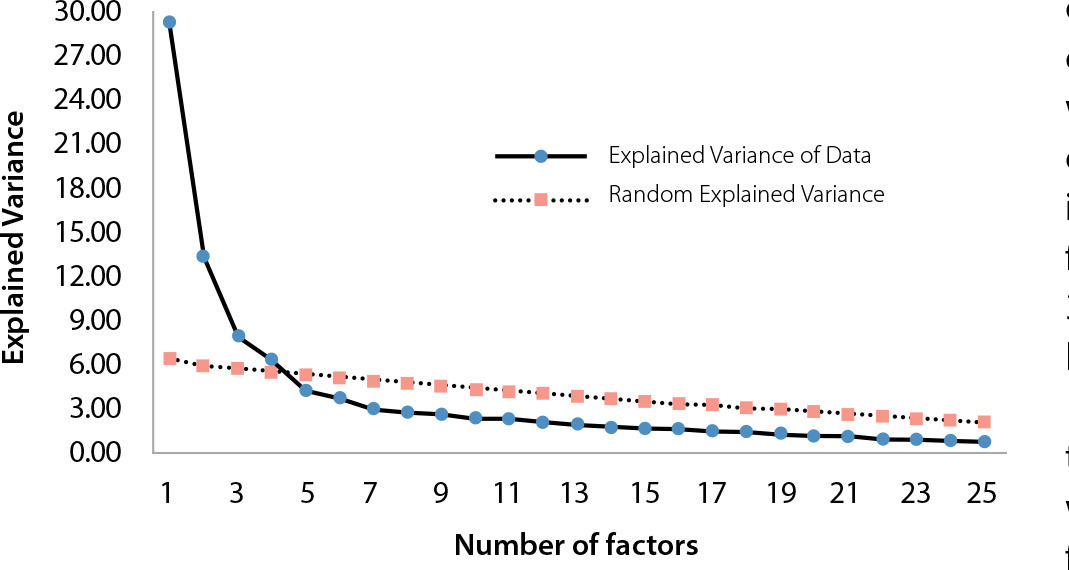
-
ORIGINAL ARTICLE07-29-2024
Nurses’ perspectives on nurses’ work methods
Revista Brasileira de Enfermagem. 2024;77(3):e20230374
Abstract
ORIGINAL ARTICLENurses’ perspectives on nurses’ work methods
Revista Brasileira de Enfermagem. 2024;77(3):e20230374
DOI 10.1590/0034-7167-2023-0374
Views0See moreABSTRACT
Objectives:
To analyze nurses’ perspectives on nurses’ work methods in the hospital context.
Methods:
A descriptive study with a qualitative approach was conducted in a hospital in northern Portugal, involving 17 nurses. Semi-structured interviews were used for data collection. Data collected between May and June 2023 underwent content analysis, supported by Atlas.ti software.
Results:
Three thematic areas emerged: “Nurses’ work methods in a hospital context,” highlighting the conception and components of work methods and the methods in use; “Implementation of nurses’ work methods,” emphasizing influencing factors and challenges to implementation; and “Impact of nurses’ work methods on patients, nurses, and institutions.”
Final Considerations:
Nurses’ work methods constitute the structure of nursing care. Some factors influence and some challenges arise in the implementation of these methods, producing impacts on patients, nurses, and institutions.

-
ORIGINAL ARTICLE07-29-2024
Nursing Process for institutionalized older adults: contributions from knowledge awareness workshop
Revista Brasileira de Enfermagem. 2024;77(3):e20230349
Abstract
ORIGINAL ARTICLENursing Process for institutionalized older adults: contributions from knowledge awareness workshop
Revista Brasileira de Enfermagem. 2024;77(3):e20230349
DOI 10.1590/0034-7167-2023-0349
Views0See moreABSTRACT
Objective:
To analyze the knowledge of professionals working in a Nursing Home about the Nursing Process before and after the awareness workshop.
Methods:
This is strategic action research, developed with nursing professionals and managers of a Nursing Home in Rio Grande do Sul, Brazil. Data were collected between January and June 2023, through semi-structured interviews before and after an awareness workshop. Discursive textual analysis of the data was carried out.
Results:
The central category “Understanding about the Nursing Process in Nursing Homes” emerged, which was unitized into two units of meaning and three categories of analysis.
Conclusion:
Data revealed non-use and lack of knowledge of the Nursing Process before awareness raising. Afterwards, a deeper understanding of the topic and its importance was identified. Awareness-raising workshops contribute to transformation of knowledge.
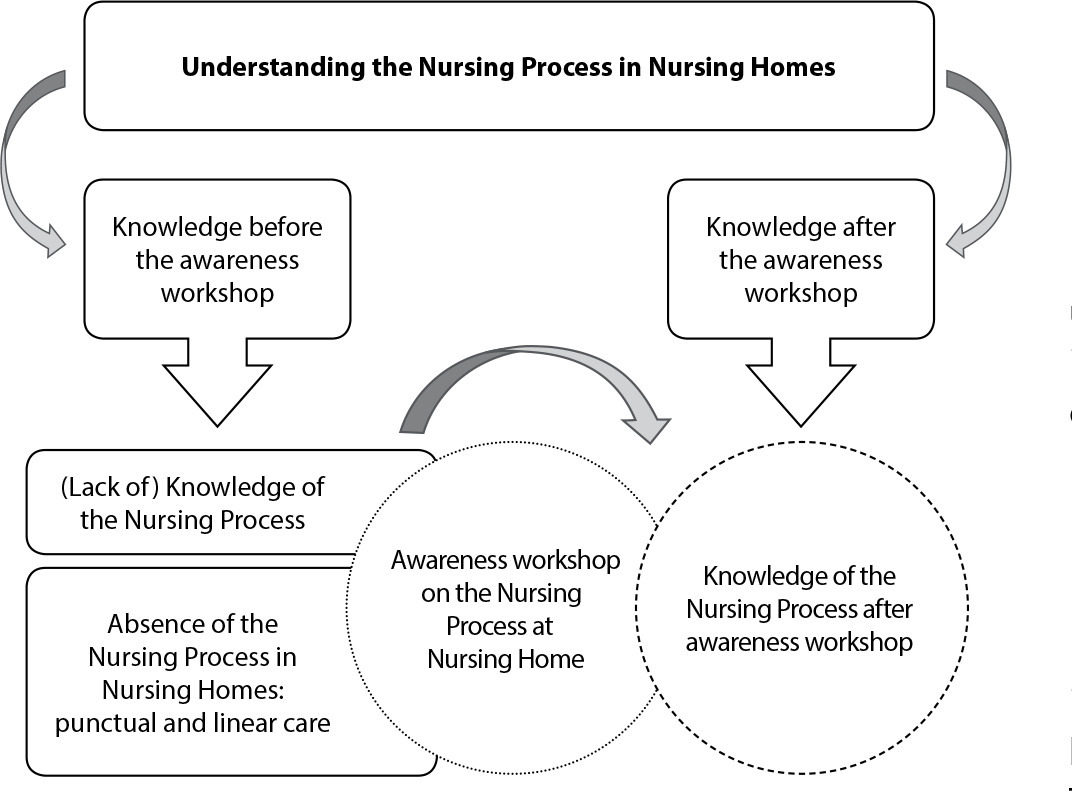
-
ORIGINAL ARTICLE07-29-2024
Excessive daytime sleepiness in nursing technicians: association with sleep quality and memory
Revista Brasileira de Enfermagem. 2024;77(3):e20230332
Abstract
ORIGINAL ARTICLEExcessive daytime sleepiness in nursing technicians: association with sleep quality and memory
Revista Brasileira de Enfermagem. 2024;77(3):e20230332
DOI 10.1590/0034-7167-2023-0332
Views0See moreABSTRACT
Objective:
to investigate excessive daytime sleepiness prevalence among nursing technicians and the association with sleep quality and memory.
Methods:
a cross-sectional, inferential study, carried out in a hospital unit in the state of Goiás between December 2020 and January 2021. Assessments were carried out using the Epworth Sleepiness Scale, the Pittsburgh Sleep Quality Index and the Prospective and Retrospective Memory Questionnaire, instruments validated for the Brazilian context. Bivariate and multivariate logistic regression analyzes were performed.
Results:
the sample consisted of 189 nursing technicians with a 40.9% excessive daytime sleepiness prevalence. In multivariate models, excessive daytime sleepiness was not associated with sleep quality, however there was a significant association with overall memory failures.
Conclusions:
study results demonstrate a high excessive daytime sleepiness occurrence, an association with overall memory failures and the need for psychosocial interventions for nursing technicians.
-
ORIGINAL ARTICLE07-29-2024
Educational technology for multidisciplinary training for managing waiting lists for elective patients
Revista Brasileira de Enfermagem. 2024;77(3):e20230299
Abstract
ORIGINAL ARTICLEEducational technology for multidisciplinary training for managing waiting lists for elective patients
Revista Brasileira de Enfermagem. 2024;77(3):e20230299
DOI 10.1590/0034-7167-2023-0299
Views1See moreABSTRACT
Objectives:
to construct and assess an educational technology for managing patient waiting lists for multidisciplinary training.
Methods:
study supported by Instructional Design – ADDIE model, whose stages of construction of educational technology were developed in the form of a multi-professional training course. Its respective content assessment was carried out by a committee of experts from 2021 to 2022. The analysis occurred based on the proportion of content adequacy with 95% Confidence Interval.
Results:
seventeen products were created as educational technology learning objects: five storyboards; four videos; three comic books; two pedagogical action plans; a mind map; and a YouTube® playlist. Nine experts assessed content adequacy, which reached 0.89.
Conclusions:
this educational technology contributes to the performance of professionals who manage waiting lists by reducing inequalities, alleviating differences, in addition to promoting equity in care and good health for patients in the Brazilian Health System.

-
ORIGINAL ARTICLE07-29-2024
Fuzzy Logic: vulnerability of women who have sex with women to sexually transmitted infections
Revista Brasileira de Enfermagem. 2024;77(3):e20230271
Abstract
ORIGINAL ARTICLEFuzzy Logic: vulnerability of women who have sex with women to sexually transmitted infections
Revista Brasileira de Enfermagem. 2024;77(3):e20230271
DOI 10.1590/0034-7167-2023-0271
Views0See moreABSTRACT
Objective:
To describe the possibility of applying Fuzzy Logic in analyzing the vulnerability of Women Who Have Sex with Women to Sexually Transmitted Infections/HIV/AIDS.
Methods:
We developed a Fuzzy Logic system with 17 input variables and one output variable, using data related to vulnerability in a municipality located in the Midwest region of the State of São Paulo, Brazil.
Results:
The factor with the greatest positive impact was the confirmation that a low understanding of Sexually Transmitted Infections/HIV/AIDS is associated with higher vulnerability. Conversely, the statement “Not disclosing sexual activity to healthcare professionals,” where individuals do not admit to having sex with women, had the least impact.
Conclusions:
Fuzzy Logic facilitates the identification of vulnerability, expressed through the analysis of interaction between variables in each dimension. This makes it a promising method to assist in analyzing the vulnerability of specific populations.
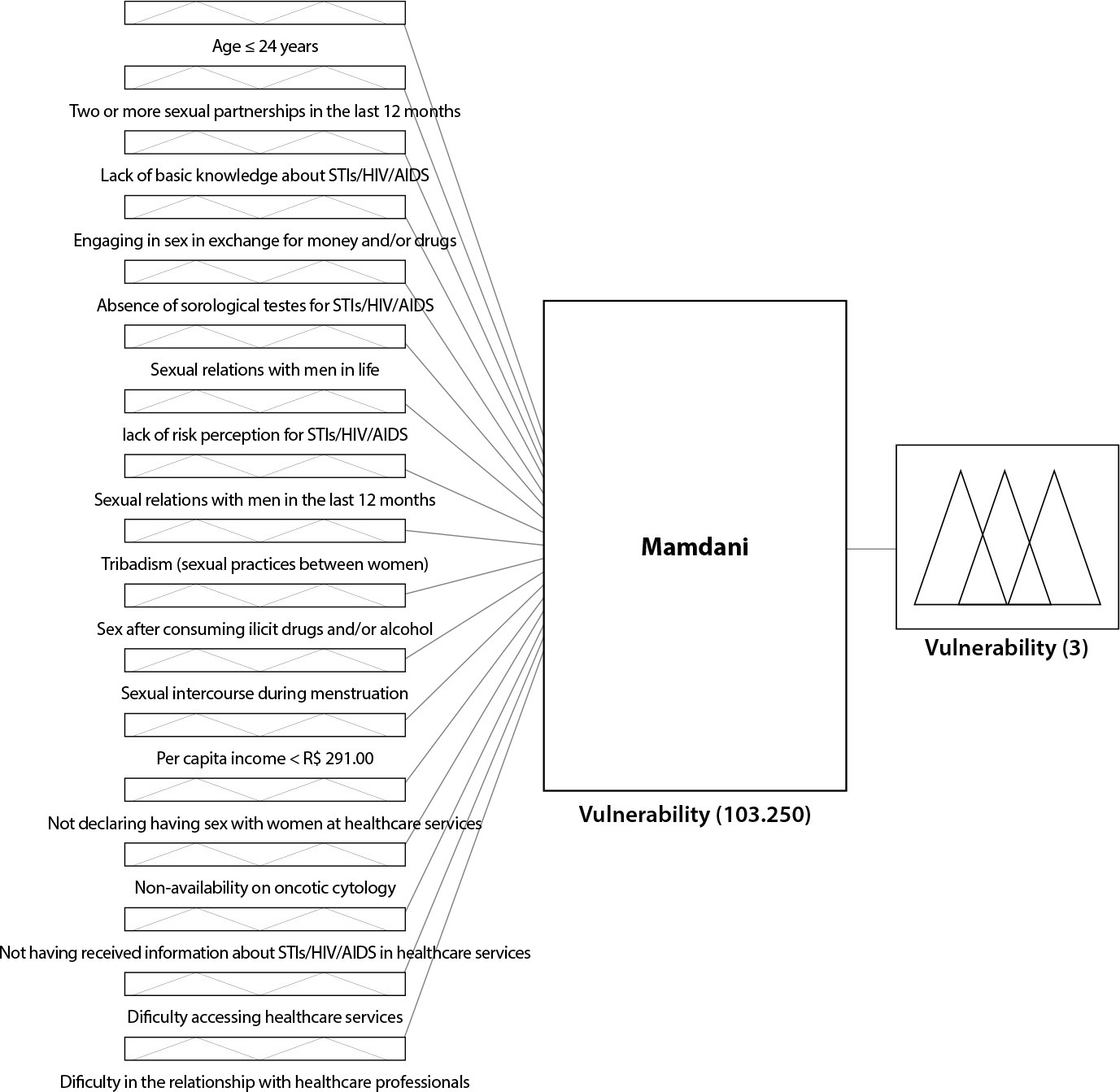
-
ORIGINAL ARTICLE07-29-2024
University Student Depression Inventory, Brazilian Version, Construct Assessment
Revista Brasileira de Enfermagem. 2024;77(3):e20230232
Abstract
ORIGINAL ARTICLEUniversity Student Depression Inventory, Brazilian Version, Construct Assessment
Revista Brasileira de Enfermagem. 2024;77(3):e20230232
DOI 10.1590/0034-7167-2023-0232
Views0See moreABSTRACT
Objectives:
to assess the University Student Depression Inventory, Brazilian version (USDI-BR), construct.
Methods:
a methodological study carried out with a snowball probabilistic sample, consisting of 334 undergraduate and graduate students. Confirmatory factor analysis, reliability using McDonald’s omega coefficient and Cronbach’s alpha were performed. Principal component analysis was performed using the varimax rotation and oblimin rotation, using the Kaiser-Meyer-Olkin criteria, Bartlett’s test of sphericity and scree plot.
Results:
the USDI-BR presented an internal consistency of items of ω = 0.95 and remained with 30 items, with the addition of 1 factor (Death wish and social withdrawal), totaling 4 factors.
Conclusions:
the USDI-BR has evidence that points to its validity and also its internal consistency, deserving that new studies be carried out to expand the evidence of its psychometric properties.
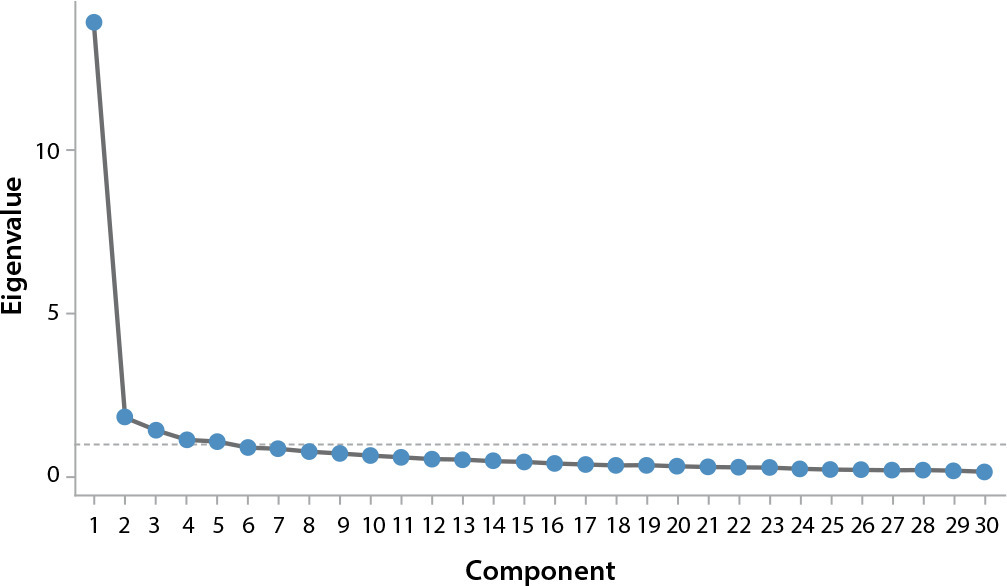
-
ORIGINAL ARTICLE07-29-2024
Family refusal of skin donation for transplantation: trends and associated factors
Revista Brasileira de Enfermagem. 2024;77(3):e20230209
Abstract
ORIGINAL ARTICLEFamily refusal of skin donation for transplantation: trends and associated factors
Revista Brasileira de Enfermagem. 2024;77(3):e20230209
DOI 10.1590/0034-7167-2023-0209
Views0See moreABSTRACT
Objectives:
to analyze the trends and factors associated with family refusal of skin donation for transplantation.
Methods:
this cross-sectional study was conducted in the State of São Paulo, with family authorization terms collected from 2001 to 2020. The variables analyzed included year, age, gender, cause of death, and type of institution. Data were analyzed using linear and multiple logistic regression, with the Odds Ratio estimated at p<0.05 for statistical significance.
Results:
1,355 individuals refused skin donation. The trend of refusals decreased between 2001 and 2009 in the age groups of 0-11 years and 12-19 years, but increased in the group aged ≥60 years. This trend continued to decrease in the 0-11 years group from 2010 to 2020, and increased in the 20-40 years group. Males and the age groups of 20-40 years, 41-59 years, and ≥60 years exhibited 27%, 34%, 47%, and 53% lower chances of refusal, respectively.
Conclusions:
there is an urgent need for measures to mitigate the high number of refusals associated with skin donation.
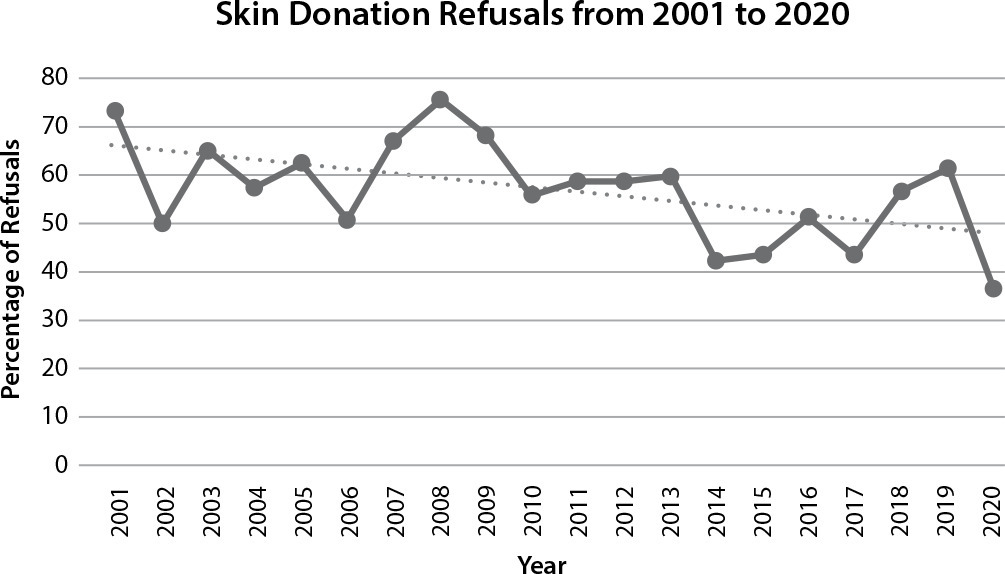
Search
Search in:
Nuvem de Tags
Adolescente (85) Atenção Primária à Saúde (239) COVID-19 (91) Criança (91) Cuidados de Enfermagem (269) Educação em Enfermagem (151) Educação em Saúde (139) Enfermagem (930) Enfermagem Pediátrica (86) Estudantes de Enfermagem (77) Estudos de Validação (131) Família (87) Idoso (208) Promoção da Saúde (99) Qualidade de Vida (104) Saúde do Trabalhador (86) Saúde Mental (145) Saúde Pública (82) Segurança do Paciente (150) Tecnologia Educacional (100)



